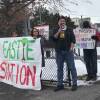Gov. Maura Healey on Wednesday filed a $55.5 billion state budget that proposes a major boost for environmental and energy agencies, locks in tuition rates for Massachusetts students at state universities, and provides free phone calls for people in state prisons.
“Today, we wanted to present a budget that will set Massachusetts up for success by lowering costs, growing our economy and delivering on the promise of our people,” Healey said. “Together, we’re putting forth ambitious goals and historic, significant investments.”
Healey’s budget for the 2024 fiscal year would increase spending by about 4% over this year’s budget, and it creates a dedicated trust fund for revenue from the state’s new tax on incomes over $1 million.
Voters approved that tax at the ballot last November, and the money it generates is dedicated to education and transportation causes. Healey is planning to split $1 billion in millionaire’s tax revenue roughly evenly between education and transportation, with a substantial chunk of it — $360 million — going towards higher education.
“Our public higher ed grads, they’re our future teachers and nurses and business owners and accountants and entrepreneurs,” said Lt. Gov. Kim Driscoll, a Salem State University graduate. “The majority of folks graduating from our public higher ed institutions, they stay right here in the commonwealth.”
Healey is proposing to use $59 million of the millionaire’s tax money for what she’s calling “tuition stabilization” in the public higher education system — in-state undergraduates at the UMass campuses and state universities would pay the same tuition rates throughout their four years, rather than facing annual increases.
UMass President Marty Meehan said the tuition certainty "will help our students and their families plan for the cost of a UMass education while encouraging more students to finish their degree in four years, both of which will result in a more affordable degree."
Other goals Healey has in mind for the surtax revenue include reducing waitlists for child care subsidies, expanding early college programs, creating a new grant to help fund municipal transportation projects, and stepping up investments in highway bridge preservation. Healey also wants to steer some of this money to regional transit authorities and to the MBTA, where it will help cover start-up costs for a means-tested fare program to make the T less expensive for people with lower incomes.
Healey’s budget also:
- Requires the Department of Correction to provide up to 1,000 minutes a month of free phone calls, estimated to cost $20 million. Lawmakers advanced no-cost calls legislation last year, but couldn’t get former Gov. Charlie Baker on board.
- Increases funding for the Executive Office of Energy and Environmental Affairs by 24%, including money for 240 new staff members. The major funding hike prompted Sen. Mike Barrett, a Lexington Democrat who co-chairs the Telecommunications, Energy and Utilities Committee, to call Healey's plan "the best executive branch budget I've ever seen" and "a leap over anything a governor has proposed before."
- Includes $324 million for the emergency assistance family shelter program, a 48% increase. The Healey administration says the program is expected to serve 338 new families a month in fiscal 2024.
- Delivers on a promise she made in her inaugural address by including $20 million to make community college free for eligible students age 25 and older. State financial aid already exists to defray the cost of community college, and Healey’s office says the MassReconnect scholarships “would offer students last-dollar financial support to cover the cost of tuition, fees, books and supplies as well as provide funding for career and wraparound support services to encourage retention and degree completion.”
Alongside her budget, Healey also formally filed the $742 million tax-break package she announced Monday and a bill to add a dedicated housing secretary in her cabinet.
Doug Howgate, president of the Massachusetts Taxpayers Foundation, said Healey’s budget shows the state remains in a strong financial condition, giving the administration high marks for its tax relief plan, early education investments and what he called a “transparent approach to tracking and using surtax revenue.”
The Raise Up Massachusetts Coalition, which campaigned for the surtax, said Healey deserves credit for making sure that money is spent as intended on education and transportation. The coalition has knocked Healey's proposal to reform the estate tax and reduce the tax rate on short-term capital gains, assets held for a year or less.
"While the Governor’s budget proposes several meaningful new initiatives, it doesn't come close to making the investments necessary to address our workforce challenges, tackle our broken childcare system, end the housing affordability crisis, or fix the MBTA and build a 21st century statewide transportation system," the coalition said in a statement.
Healey’s budget represents a starting point in a process that will stretch for months.
The House, in mid-April, will rewrite her plan to reflect its own priorities and add in local earmarks for representatives’ districts. The Senate will follow suit, debating and passing its own budget ahead of the Memorial Day holiday, and the two branches will iron out their differences in closed-door negotiations with the goal of agreeing on a final state budget by the Jul. 1 start of the new fiscal year.
For the past several years, talks have dragged past that deadline, and the state has relied on temporary budgets to keep government running.
Have your say
GBH News is teaming up for statewide coverage of Gov. Healey's first months in office with New England Public Media in Western Massachusetts and CAI on the Cape, coast and islands. Do the governor's priorities line up with the issues that are top of mind for you? We'd like to hear what you would add to her list. Visit this page to share your thoughts.









